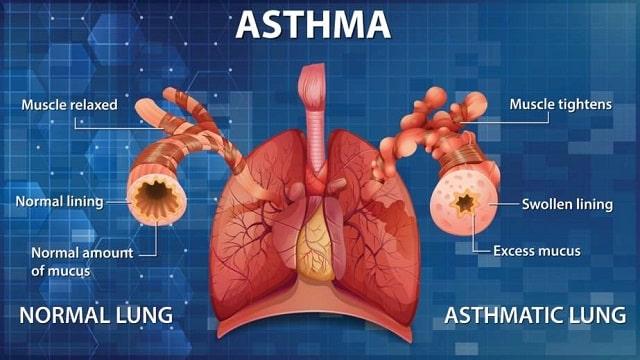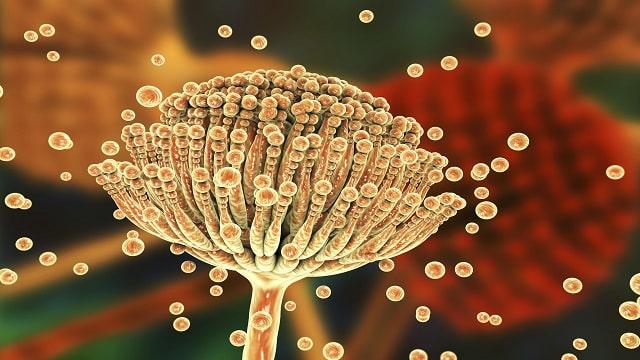
Asthma Symptoms, Risk Factors & Treatment | Diseases List A-Z
What is Asthma? Asthma is a lung problem that makes sufferers have difficulty breathing due to inflammation and narrowing of the respiratory tract.
Not only does it cause difficulty breathing, asthma also causes other symptoms such as wheezing, coughing, and chest pain.
The respiratory tract of people with asthma is more sensitive than that of people without asthma.
When the lungs are irritated by triggers (cigarette smoke, dust, animal hair, etc.
), the muscles of the sufferer’s respiratory tract become stiff and narrow.
Asthma Symptoms A person who suffers from asthma can experience various symptoms, such as: Chest tightness; Cough, especially at night or early morning; Hard to breathe; Wheezing, which causes a whistling sound when exhaling.
The pattern of symptoms in each asthma sufferer can be different.
However, the most common symptom patterns are: Come and go over time or within the same day; Starting or worsening with a viral infection, such as a cold; Triggered by exercise, allergies, cold air, or hyperventilation from laughing or crying; Worse at night or in the morning.
Causes of Asthma Asthma is a type of disease that can affect all ages.
This condition is most often caused by dust, cigarette smoke, animal hair, cold air, physical activity, viral infections, and exposure to chemicals.
However, the exact cause of asthma is still unknown.
However, asthma sufferers have been shown to have more sensitive airways.
When the lungs are irritated, the respiratory tract muscles become stiff and narrow.
Then, phlegm production increases, making it difficult for sufferers to breathe.
In children, asthma symptoms will disappear on their own when they enter adolescence.
However, in children who have quite severe asthma symptoms, the condition can persist or recur in the future.
Asthma Risk Factors Bacteria originating from dust are often the main trigger for asthma.
The bacteria is called endotoxin which is generally found in household items, especially in bedrooms, which causes asthma symptoms.
Other risk factors that can trigger asthma include: Animal fur.
Viral infection.
Exposure to chemicals.
Physical activity.
Lung and upper respiratory tract infections.
Certain jobs such as welders, carpenters, or textile mill workers; Excessive emotion (laughter or prolonged sadness).
Food allergies, such as nuts.
Asthma Diagnosis In the initial stage, the doctor will conduct a medical interview (anamnesis) and a physical examination first.
You need to know that the diagnosis of asthma is based on episodic symptoms, symptoms such as coughing, shortness of breath, wheezing, a feeling of heaviness in the chest, and variability related to the weather.
To help confirm a diagnosis of asthma, the doctor may need to perform several supporting examinations.
For example, lung function with a spirometer.
Pulmonary function measurements are used to assess: Airway obstruction; Reversibility of pulmonary function abnormalities; Pulmonary function variability, as an indirect assessment of airway hyperresponsiveness.
There are also several other tests to help doctors diagnose asthma, namely: Peak expiratory flow examination using a peak flow rate meter ; Reversibility test (with bronchodilator); Bronchial provocation test, to assess the presence/absence of bronchial hyperactivity; Allergy tests to assess the presence or absence of allergies; Chest X-ray, to rule out diseases other than asthma.
Asthma Complications Asthma that is left untreated can trigger various complications, such as: Psychological problems (anxiety, stress, or depression); Decreased performance at school or work; The body often feels tired; Growth and puberty disorders in children; Status asthmaticus, which is a severe asthma condition that does not respond to normal therapy; Respiratory failure; Damage to part or all of a lung; Asthma Treatment There are two things that need to be done in treating asthma, namely relieving symptoms and preventing symptoms from recurring.
Therefore, asthma sufferers need to be disciplined in undergoing treatment with a doctor so that asthma remains under control.
In addition to undergoing treatment, asthma sufferers must also avoid things that trigger relapses.
Typically, doctors recommend inhalers as a treatment when asthma symptoms appear.
However, the use of inhalers also has the potential to cause side effects for users.
If an asthma attack occurs with increasingly severe symptoms, even though treatment has been carried out with inhalers or medication, then medical treatment is needed in the hospital.
The reason is, asthma can also endanger the lives of sufferers.
Asthma Prevention This lung problem is a type of disease that can be controlled by adopting a healthy lifestyle.
In addition, you should pay attention to the following things: Recognizing and avoiding asthma triggers; Follow your doctor’s recommended asthma management plan; Take the right treatment steps by identifying the cause of asthma attacks; Use asthma medications recommended by your doctor regularly; Monitor the condition of the respiratory tract.
It should be noted that using an inhaler can actually increase the risk of asthma reactions.
Therefore, it is important to discuss it with a doctor, so that the asthma management plan is tailored to your needs.
Flu and pneumonia vaccinations are also recommended for people with asthma to prevent dangerous complications related to breathing.
.
Related Articles
health
Top 5 Health Benefits of Neem
October 25, 2024

5 Health Benefits of Neem: Neem or Azadirachta indica, a tree native to India, has long been revered in traditional medicine for its diverse health benefits.
Rich in antioxidants, anti-inflammatory compounds, and antimicrobial properties, neem leaves are a natural remedy for various ailments.
read morehealth
Astigmatism Symptoms, Risk Factors & Treatment | Diseases List A-Z
October 26, 2024

What is Astigmatism? Astigmatism or cylindrical eyes are visual disturbances caused by defects in the curvature of the lens or cornea.
This condition can cause vision to become distorted or blurred.
read morehealth
Aspergillosis Symptoms, Risk Factors & Treatment | Diseases List A-Z
October 26, 2024

Aspergillosis Aspergillosis or aspergillosis is a disease caused by infection with the fungus Aspergillus.
Almost every time humans inhale Aspergillus spores without getting sick.
read more